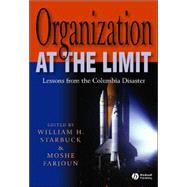
What is included with this book?
Moshe Farjoun is an associate professor at the Schulich School of Business, York University, Toronto. His research interests lie in the intersection of strategic management and organization. His research has explored market and organizational dynamics, particularly as they pertain to the processes of strategy formulation, implementation and change. His articles have appeared in Strategic Management Journal, Academy of Management Journal, Organization Science, and Academy of Management Review.
| Notes on Contributors | p. viii |
| Preface | p. xvii |
| Introduction | p. 1 |
| Introduction: Organizational Aspects of the Columbia Disaster | p. 3 |
| Synopsis: NASA, the CAIB Report, and the Columbia Disaster | p. 11 |
| The Context of the Disaster | p. 19 |
| History and Policy at the Space Shuttle Program | p. 21 |
| System Effects: On Slippery Slopes, Repeating Negative Patterns, and Learning from Mistake? | p. 41 |
| Organizational Learning and Action in the Midst of Safety Drift: Revisiting the Space Shuttle Program's Recent History | p. 60 |
| The Space Between in Space Transportation: A Relational Analysis of the Failure of STS-107 | p. 81 |
| Influences on Decision-Making | p. 99 |
| The Opacity of Risk: Language and the Culture of Safety in NASA's Space Shuttle Program | p. 101 |
| Coping with Temporal Uncertainty: When Rigid, Ambitious Deadlines Don't Make Sense | p. 122 |
| Attention to Production Schedule and Safety as Determinants of Risk-Taking in NASA's Decision to Launch the Columbia Shuttle | p. 140 |
| The Imaging Debate | p. 157 |
| Making Sense of Blurred Images: Mindful Organizing in Mission STS-107 | p. 159 |
| The Price of Progress: Structurally Induced Inaction | p. 178 |
| Data Indeterminacy: One NASA, Two Modes | p. 202 |
| The Recovery Window: Organizational Learning Following Ambiguous Threats | p. 220 |
| Barriers to the Interpretation and Diffusion of Information about Potential Problems in Organizations: Lessons from the Space Shuttle Columbia | p. 246 |
| Beyond Explanation | p. 267 |
| Systems Approaches to Safety: NASA and the Space Shuttle Disasters | p. 269 |
| Creating Foresight: Lessons for Enhancing Resilience from Columbia | p. 289 |
| Making NASA More Effective | p. 309 |
| Observations on the Columbia Accident | p. 336 |
| Conclusion | p. 347 |
| Lessons from the Columbia Disaster | p. 349 |
| Index of Citations | p. 364 |
| Subject Index | p. 370 |
| Table of Contents provided by Ingram. All Rights Reserved. |
The New copy of this book will include any supplemental materials advertised. Please check the title of the book to determine if it should include any access cards, study guides, lab manuals, CDs, etc.
The Used, Rental and eBook copies of this book are not guaranteed to include any supplemental materials. Typically, only the book itself is included. This is true even if the title states it includes any access cards, study guides, lab manuals, CDs, etc.